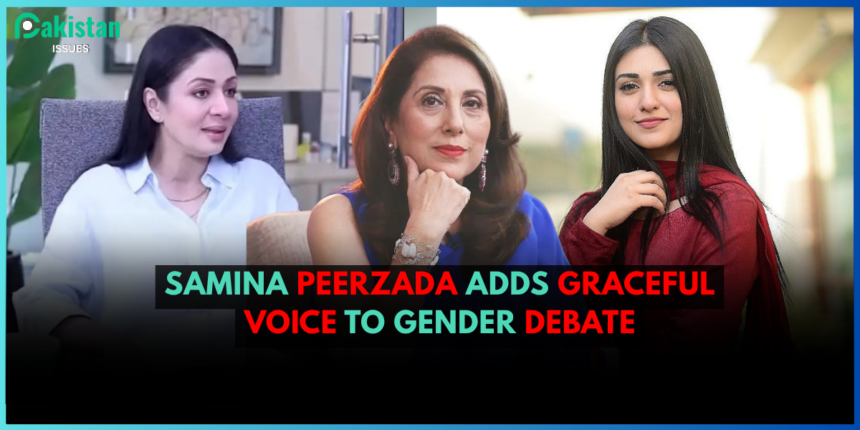The public response was overwhelming. Her followers praised her for, among other things, signs of maturity in not buying into ducking the blame or using social media to want to get- even. Rather than go tit for tat, she found a quiet medium, and made her point without all the accompanying hullabaloo, even without punching down. Whilst there is a lot of outrage online that goes viral, Samina’s response is a unicorn!
There’s been a lot of noise lately in the entertainment industry — and not the kind that fades overnight. Comments by Sarah Khan and Saima Qureshi about a woman’s role in marriage and income being “unblessed” stirred up strong reactions. But while others kept fueling the fire, Samina Peerzada chose a different path — a softer, wiser one.
Speaking in an interview with journalist Aamna Haider Isani, Samina didn’t take any names, but her words clearly responded to the heated views being tossed around. Instead of throwing shade, she shared stories from her own life — a style that’s always been her strength.
She spoke about the little things — a man opening a door, picking up the bill — not as requirements, but as reflections of his upbringing. “I can open a door for myself,” she said. “But when a man does it, it shows his manners.” That one line hit home for many people, especially women tired of the endless tug-of-war between tradition and modernity.
Then came her quiet clapback to the claim that a woman’s income lacks barkat. “My husband built our house, I paid for our daughter’s education. That’s how it’s always been — a partnership,” she said. No drama, no outrage — just a real answer rooted in lived experience. And that’s what made it land so strongly.
Peerzada also touched on another side of marriage — supporting each other’s families. She recalled how she and her husband stood by not only each other but also by their extended families. “You don’t marry a person alone, you marry their people too,” she noted, a line many viewers shared and praised online.
Most online discussions devolve quickly into some kind of mess with no regard for civility. Samina’s response was fairly measured. It didn’t set up traditions opposed to feminism. It didn’t patronize or make fun of anybody. It simply reminded us that respect is not determined by who is the bigger wage earner who goes to work every day or who stays home and makes a earnings contribution by doing the family care work that underpins unpaid domestic work: it is about care, contribution and mutual respect.
The public response was overwhelming. Her followers praised her for, among other things, signs of maturity in not buying into ducking the blame or using social media to want to get- even. Rather than go tit for tat, she found a quiet medium, and made her point without all the accompanying hullabaloo, even without punching down. Whilst there is a lot of outrage online that goes viral, Samina’s response is a unicorn!
What Samina Peerzada proved — yet again — is that experience speaks louder than opinions. And sometimes, a story from real life is more powerful than a thousand arguments.










